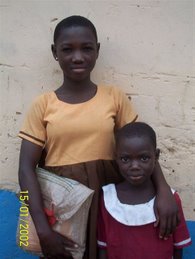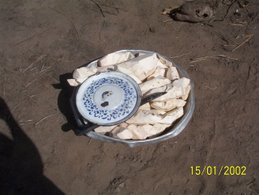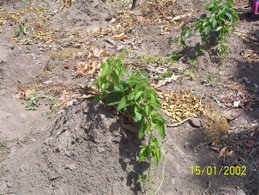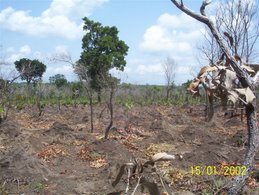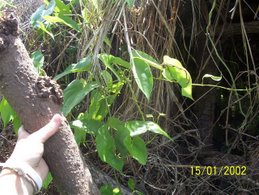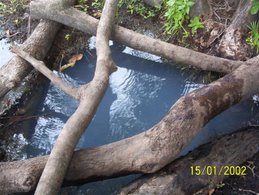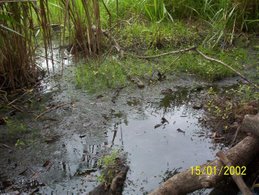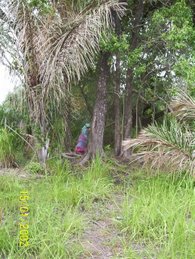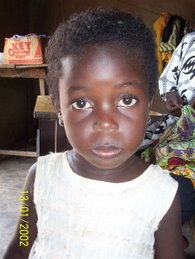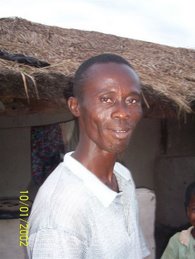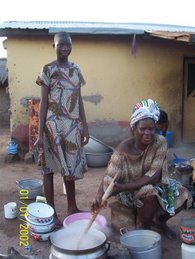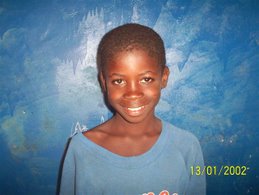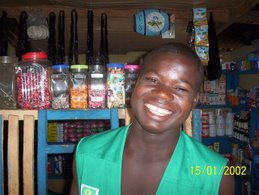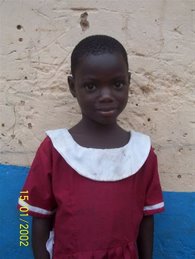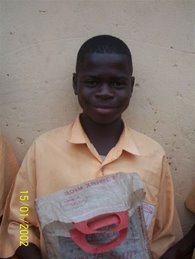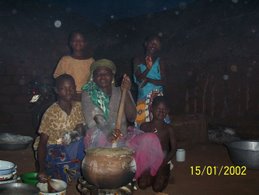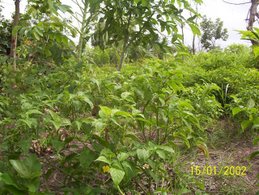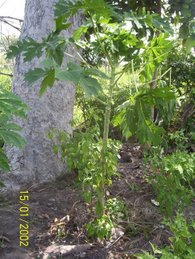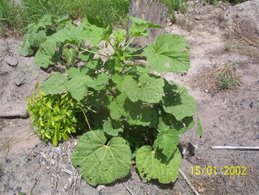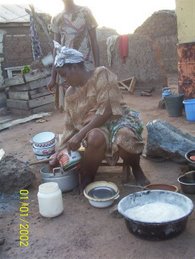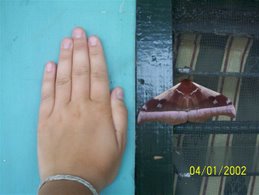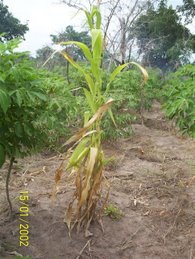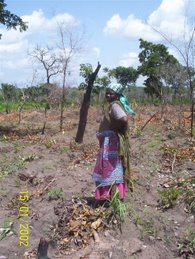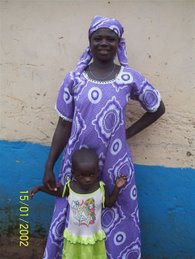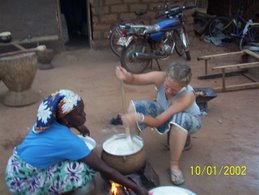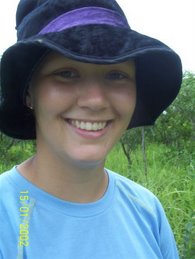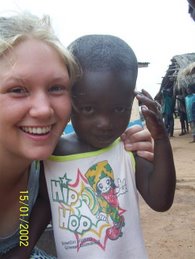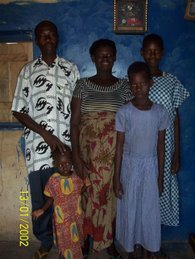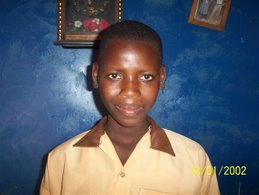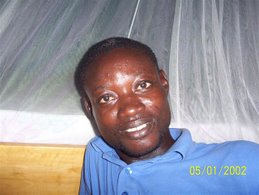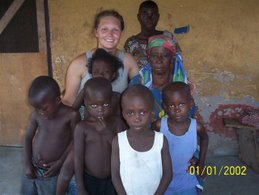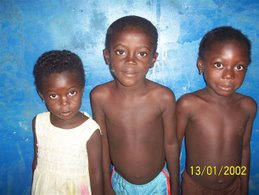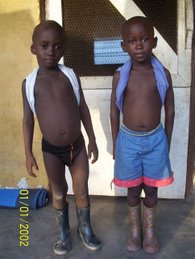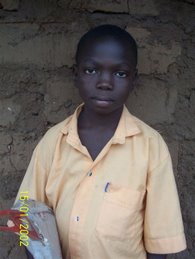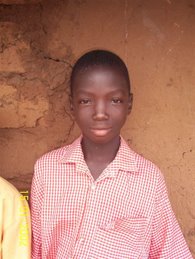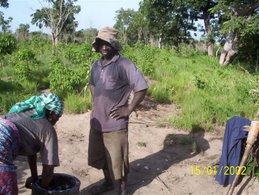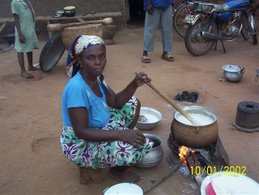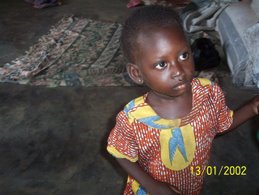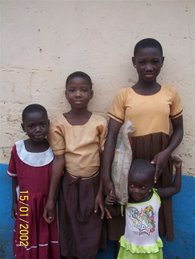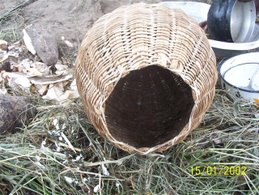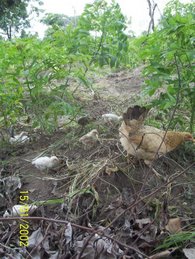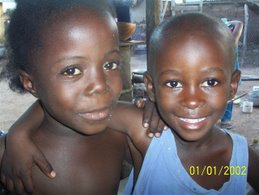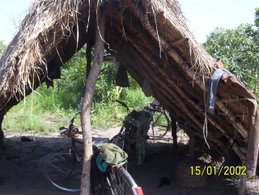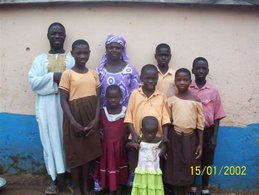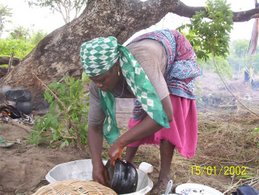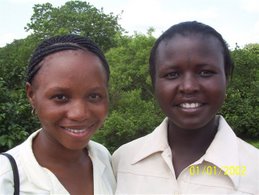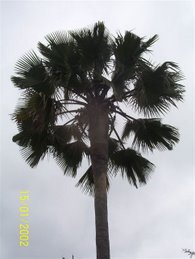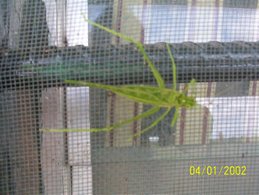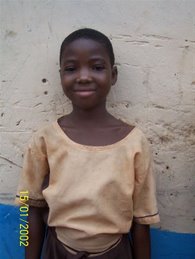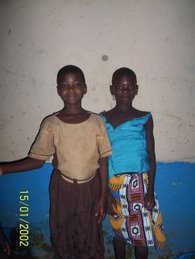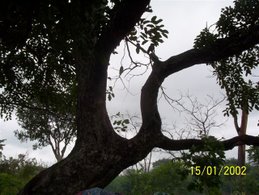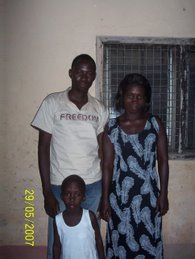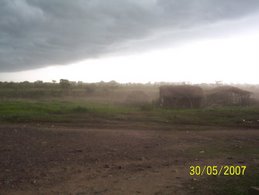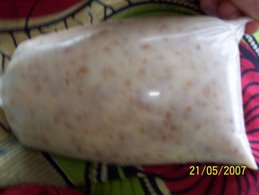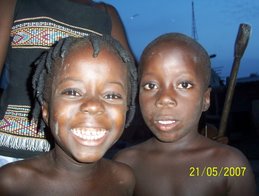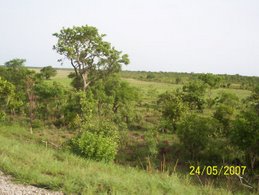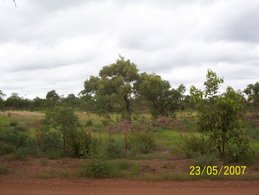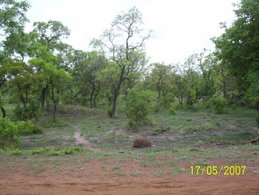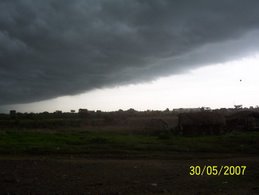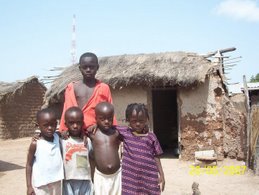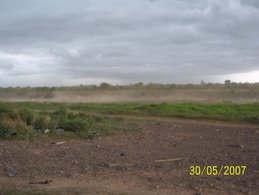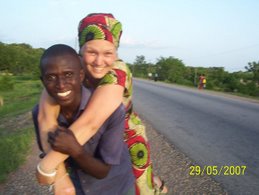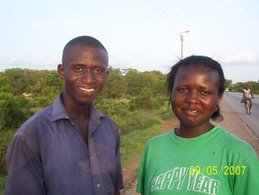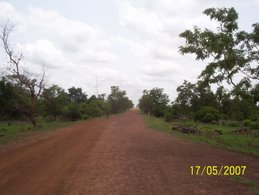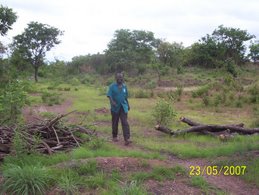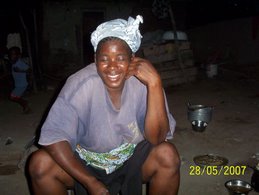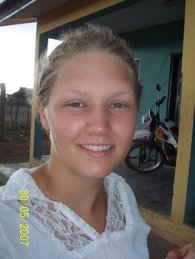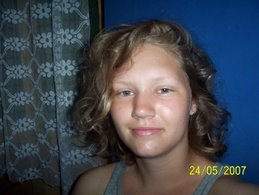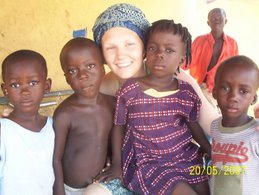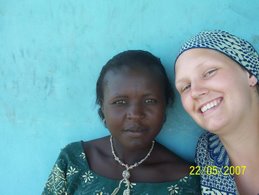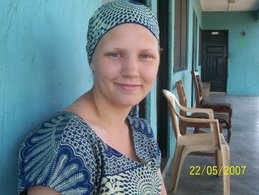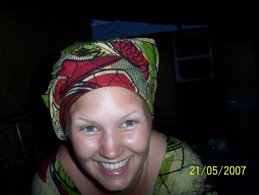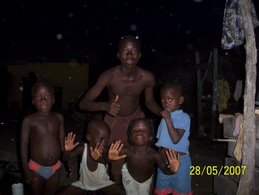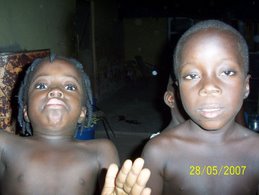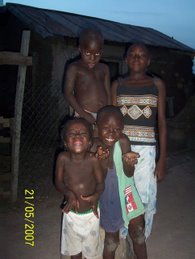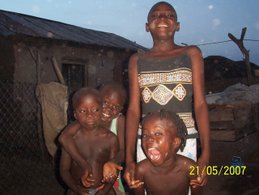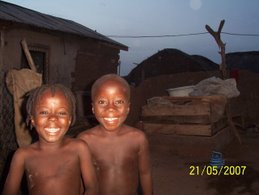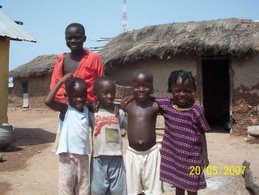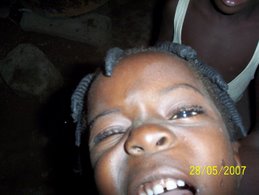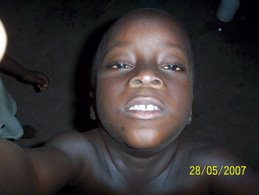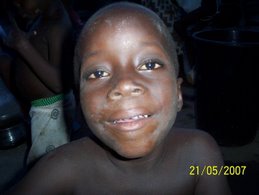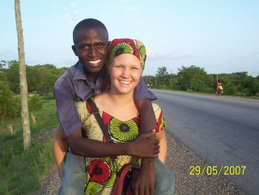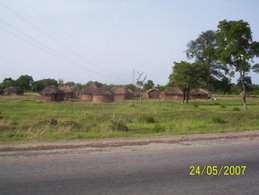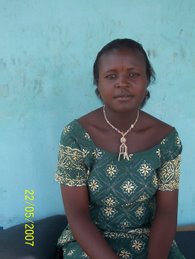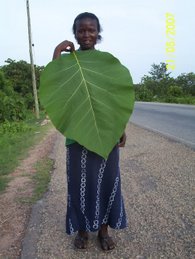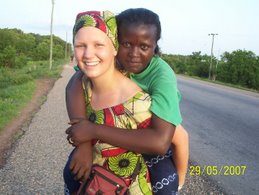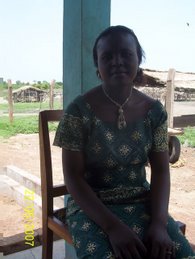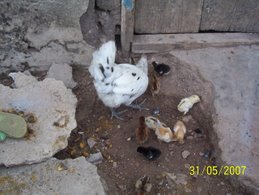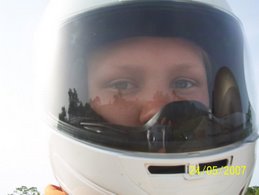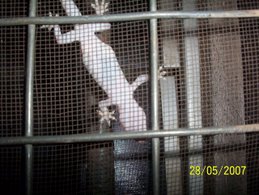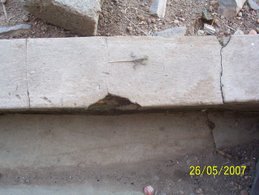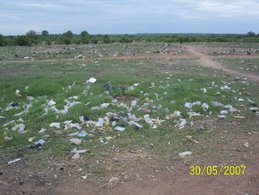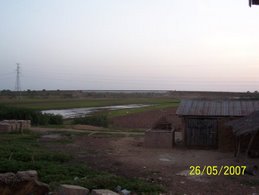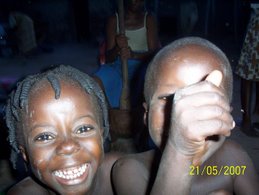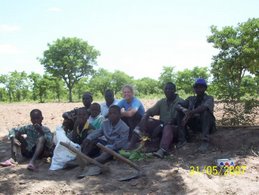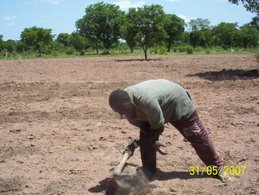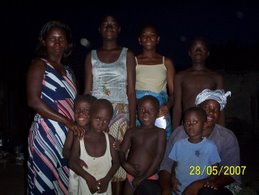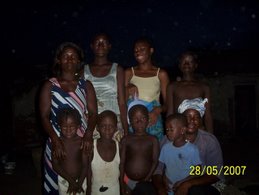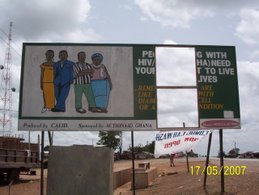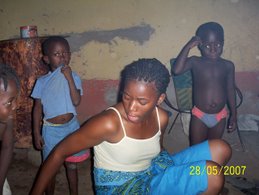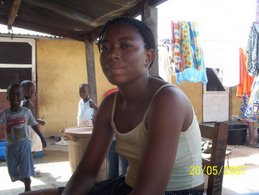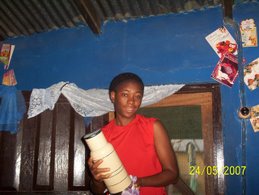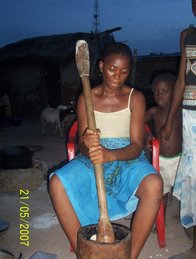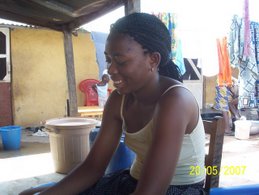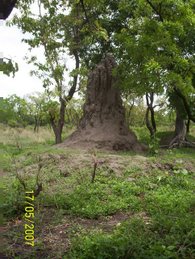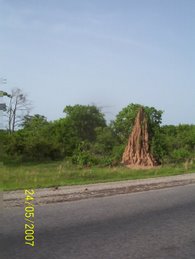Thursday, August 23, 2007
I am Back, to Toronto anyways
-Jess
Sunday, June 24, 2007
I have arrived at my summer mid-point and my birthday too; yep on the 29th I will be 20 and celebrating here in Ghana.
I have to been very glad to be away from the office the last few weeks; I spent 10 days in a village near by. In Lito, I spent my days working on the farm and at the home. At the farm I planted a variety of different seeds with the two wives in my family, carried water from a nearby water hole (literally, I will send a picture), helped pick and process vegetables and leaves, and prepared food for the workers and ourselves. There are six men that work weeding, planting and harvesting with my landlord Mr. Mohamed Iddrisu as well as his many children that just work on the weekends (as they attend school in the week).
So far, the farms I have seen in Ghana, including the one I worked on, are very different than most farms I have seen in Canada. Despite the size difference, these "small" farms are much more like massive gardens growing a variety of different crops in one area. Although there are many crops they are not separated into sections or rows, rather mixed all together. When I send pictures you will better be able to understand what I am trying to explain. A yam hill will have okra (a green vegetable used in soups) planted at the base in both sides, a tree growing between two yam hills will have a squash vine growing up it (haven't been able to get a confirmed name, but it is just used in soups for its seeds), and between four yam hills there will be pepper sprouts coming up, just to name a few. Everything is just growing together; there is much diversity in one field.
Mr. Iddrisu and his family primarily grow cassava, a root, for profit. This root is used in a variety of Ghanaian dishes and is prepared a variety of ways. As flour it is used with maize flour to make TZ, a staple food in most households, as dough to also be used with maize dough to make banku, and also it can be grated, dried, pressed and fried for gari and starch, which are both taken as porridge with milk and sugar. As mentioned before, they also grow yams, okra, squash and pepper. In addition to these, there are dowadowa trees (the seeds are used in soup), shea trees (produces a fruit you can eat and a nut which can be processed into oil or butter which is used in cosmetics), pawpaw (papaya) trees (fruit producing), maize and a new addition- a banana plant. Aside from the farm, the first wife also keeps two gardens in the village which she grows a variety of vegetables in all year round. I also forgot to mention that he runs a provision store in Lito selling a variety of foods and medicines and other household items.
I have so much more to tell, but because I was in the village so long I couldn't write much up. This may be my last post for a while as I have no more plans to return to the city until I am ready to go home. So if you are trying to follow me, wait a month before you check.
Once again, I would be glad to hear from you, so call me if you can. From Canada you can try to get me at 011-233-24-968-4072. It may be difficult to get through so try a lot. Remember I am 6 hours ahead of MST. If it is too costly for you to call me, you can flash me (call and hang up before I get it) or send me a text and I will happily call you back.
Lots of Love from Ghana,
Kanyiti
Sunday, June 3, 2007
Enjoy!
-Stephen
May 30, 2007
Hey y’all,
Sorry for not posting as much as I hoped to. There is no internet in my community, Buipe, so I must travel to Tamale and pay to use it. This trip takes about 2 hours each way and costs quite a bit, especially compared to how cheap it is to live in Ghana. When I get there it is not that uncommon that there will be no power for the entire weekend and I wont be able to send anything anyway.
I am having a wonderful time here. For the most part people are super friendly and excited to see me. When I arrived in
My Village – Buipe, Central Gonja District, Northern
I am living in a small community about 1 ½ to 2 hrs south of Tamale, the largest city in the Northern Region of Ghana, on the main road. Many big trucks pass through everyday as this single lane route acts as a major port route for Ghana, Burkina Faso, and possibly others. It was evident to me on my way to Tamale from
Because Buipe is on this main route the traffic volume is high, collisions are frequent and night activity is regular. Although no bread is made in my village or a variety of fruit grown some is brought in from Tamale to be sold to the uncomfortable riders who cannot wait to get to their destination, and those villagers wanting a quick snack. Vendors become plenty in the evening when most busses will come though.
Like most cities or towns in
By the way, Buipe means to hold tight. The village was named after this when many years ago a Gonja warrior by the name of Jakpa died in battle and was carried down to the river, the
The Market
The market is huge part of everyone’s life. It comes every Monday and lasts all day. I say that it comes because traders literally come by boat down the
My Family
My royal family actually. My father was a chief until he passed away 2 years ago at a very old age. He had 2 wives and 15 children. Although polygamy is common in Ghana he actually only had one wife at a time, as the first one passed away and a new one was wed to have many children with and to care for his current children. This is a fairly common family working in
Most importantly I must tell you about my sister, Azara. She is 22 and works for the National Health Insurance Scheme of Ghana and speaks quite fluent English, making it very easy for me to communicate when I cannot say what I want in Gonja (the most common local language); most importantly she translates what others are saying to me. She is helping me learn the language, but it is going very slow as the left side of my brain functions at a much slower rate them my right. The children here (about 10 younger then me) are also helping me learn Gonja and I am helping them with their English.
Oh, and sometimes we listen to the oldies country music station from
My Health
I have not yet been very sick, which I am very thankful for. Everyday I walk to work 2 miles each way. You would not believe the number of people that still stop to offer me a ride or insist that I take a taxi. They all say it is too far for me to walk and that I will be very tired. They ask why I do not take a taxi or ride a bike; I tell them it is too expensive. One man today (May 30) even offered to buy me a bike, but I told him that was too big of a gift. It is also amazing the number of people that will offer to carry something as small as a loaf of bread for me as they think I am unable. I tell them all that I walk much further with a big load on my back for fun, or I just say that I have two feet that work just fine and that I have not yet needed there help. My colleagues say I walk because I want to exercise my body, but really it is so I get to work on time (they are always late and they have motorbikes). So, why do I walk? Because I want to and I can.
I exercise my body on the weekends with the All Male Teachers’ 4pm Volleyball Club (not actually there name). It is lots of fun, and given our red-dirt court I get very dirty very fast, it is funny that I am the only one that shows it. Our ball is in very rough shape and the net has seen better days, but it works (sometimes).
My Work
I am working for the Ministry of Food and Agriculture (MoFA) in the Central Gonja District where I live. This is new district, created in 2004, so things are not very organized or set in stone yet as it seems. We are currently working on 5 projects: Food Crops Development Project (FCDP), Livestock Development Project (LDP), Cashew Development Project (CDP), FARMER (a joint project sponsored in part by the Canadian International Development Agency - CIDA), and Women in Agriculture Development (WIAD). As these projects may indicate we focus on crops, livestock, engineering (post-harvest structures), fisheries, and gender.
So far I have gone to 5 different villages and met many people with a few of my colleagues. Soon I return to the first village, LingBing Kura, and plant groundnuts in one of the fields. We will be doing this to demonstrate to the farmers the benefits of planting crops in rows as opposed to just scattering seeds. If all goes as planned crop yields will increase significantly, and weeding and harvesting will be much simpler for the farmer.
Because I am a westerner my colleagues all think I am a computer wiz. They were surprised to find out that I don’t have a computer, I have never used Access, CorelDraw is a complete blur to me and that I only have ‘small-small’ skills in Word, Excel and PowerPoint. Still they want me to teach them everything I know in the next three months and still get other work done. Looks like I will be busy.
The Food
It is great. There is only one place that I have been that I didn’t like the food, rather it didn’t like me, this is the restaurant at the oil refinery depot in Buipe. It wasn’t that the food was bad (it was something I had typically eaten before), just maybe the way it was prepared two of the days I ate there that didn’t agree with me. Because Buipe is surrounded by both the White and the
The Water
There are many water source options available in my community. There is the river, which before a few years ago was the only water source, which I would definitely suggest not using for anything, not really even sure if the fish I eat from it are okay. Next there is the rain, which for this season is a great source, but like rain anywhere it is not always consistent or at least if you don’t have enough buckets to hold all the water you will need for the next few days. Next is the well, it is not covered and a bucket is used to extract the water. This is a common water venue for many people around the world, but here it is easily polluted and has very high particulate concentration (i.e. it is so clouded with dirt and everything else that I cannot see though it). I will bath and brush with it, but my family will not drink or cook with it. Next is a covered bore hole with a hand pump. This water is crystal clear, but tastes a bit like gasoline, or maybe that is just the jugs we use, but I will use it for everything. I even finally convinced my sister to let me help carry it, I don’t have a photo, but if you can imagine a large washing basin big enough to hold a child that is what we use. Lastly there is tap that we only use occasionally, I am not sure if that is because it only works occasionally or that the water is of inconsistent quality. When I saw it it was clear, but I don’t think I have ever drank it so I have no more comments. Typically I drink sachet water, water lapelled ‘hygienically filtered water’ with a government approved seal. It costs 500 cedis or about 6 ¼ cents for 500 mL, this is extremely cheap and tastes much better then most fancy bottled waters you will find in Canada. (If Brenda is reading this, I am laughing right now about some fancy expensive water she bought one time in Calgary. I had lots of fun that night.)
The Weather
The Northern Region of Ghana, where I am, is said to have one of the harshest climates, but I will let you be the judge of that…
| | May | June | July | August |
| Average rainfall (mm) | 133.5 | 169.3 | 198.7 | 222.6 |
| Average number of rain days | 11 | 12 | 15 | 17 |
| Most rain in 24 hours (mm) | 104.4 | 127 | 115.6 | 154.9 |
| Average mean temperature (deg Celsius) | 28.5 | 26.7 | 25.8 | 25.5 |
The north is considerably hotter then the south, as it is closer to the desert, but it is really not as bad when you look at the numbers. (I could have written all this information, but I enjoy the engineer in meJ) According to
So my colleague at work tells me that the weather here is very extreme, but when I bring it to his attention that Ghana has a 30*C temperature gap, at the absolute extremes, and that Canada’s gap is much closer, or even higher than an 80*C gap he is surprised.
The Rain
An entire section must be devoted to this phenomenon because it is the most controlling factor I have seen so far in
When the rain falls in
Stereotypes
There are many stereotypes that exist about Canadians and Ghanaians that I hope to bust for as many people I possible can while I am here and when I return home. Consider this a goal. One that I will mention today is one that many Ghanaians have of Canadians. I don’t want to generalize, and you can say I am wrong, but this is my account:
Every Ghanaian I have talked to says that they did not know that there was poverty in
Most people do not understand the size and diversity of
June 2, 2007
So a few things have changed since May 30 when I finalized my last post. Don’t be alarmed I am already feeling much better, but I had Malaria and was very sick for a few days. I will be honest, I thought I was going to die… and when I didn’t, I felt so horrible that I wanted to. Today I am alive and well and made the trip to Tamale where I will soon send this posting home to Stephen to get displayed for the world.
It rained Tuesday (½), Wednesday and Saturday (today) making it 7 rainy days since I arrived, and despite the Malaria and ridiculous heat I still planted groundnuts on Thursday morning. The plan was to plant a quarter acre (1000 m2), but due to insufficient seed we only did 740 m2. I also burnt my hand pretty bad. If you remember, I had a rather severe burn on the back of my right hand, and after a day in the sun it was covered in blusters and extremely painful, but today it is okay. I want to sleep now; goodnight.
I would be glad to hear from you, so call me if you can. From
Hope everyone at home is being happy, safe and healthy. I am doing my best to do that here.
Lots of Love from
Kanyiti
(My Ghanaian name meaning Patience)
In Ghana, first post
See you all soo soon.
-Jess
Saturday, May 5, 2007
My Journey to Toronto and beyond
Tuesday, May 1, 2007
Pre-departure 'Learning'
-Jess
P.S. Dad sorry I have not called, but I made it.
Wednesday, April 4, 2007
Junior Fellow Overseas Placement Description – Jessica
Context of EWB in
Having embarked on our 5th year of activities in the country, EWB's Ghana Country Program is the eldest of our current country programs. Our story in Ghana
KITE, an Accra-based NGO focused in the energy sector, was EWB's second partner in Ghana
Our experience with the Ministry of Food and Agriculture (MoFA) is more recent but just as substantial! Three long term OVS and 14(!) JFs later, we have created and replicated an Agriculture Extension Agent capacity building project as well as influenced the Northern Region's monitoring system to a level that the national office (based in Accra
Following our successful experience at the district level with MoFA we decided to approach the Water and Sanitation division and the Planning and Coordination division of the district assemblies (local government bodies). Two of our current long-term OVS and 1 JF have spent some introductory time there and we are now ready for an important and exciting scale-up of our activities, which includes 7 JFs working in 7 different districts this rainy season.
Finally, but certainly not the least, is our partnership with Rural Enterprise Projects (REP). This is a very progressive project on which 2 long-term OVS have been working within the last year. The goals of the project are to facilitate the start of micro-enterprises for underprivileged groups, particularly women. They also work through the district administration, which is great for building local capacity! We will send 2 JFs this rainy season to work at the district level with REP.
I hope this short history has helped you appreciate the growth of our partnerships in the last few years and the incredibly important learning contribution that you will all bring to our programming! Thank you for joining our team!
Your Host Organization
During the overseas component of your Junior Fellowship you will be working with the Ministry of Food and Agriculture in the Central Gonja District. The MoFA Northern Regional Office is based in Tamale.
MoFA is the public sector (government) body responsible for food and agriculture support in
Your Placement
You will be based in the town of Buipe, the capital of the Central Gonja District in the Northern Region of Ghana, where you will be working within the agriculture sector. Buipe is approximately 1.5 hours south of Tamale by tro-tro (minibus), and we have asked the MoFA staff to arrange for a home stay for you with a family in Buipe. The MoFA District Director is excited for you to live with a farmer family in the community to better understand the realities of farming in this area. Although English is the official language, people in this region generally come from the Gonja tribe and speak Gonja. Twi (the most widely spoken language in
As I mentioned to you already, I know you already have some background on MoFA through hearing about Navid and Jamaal’s experience, which will allow you to hit the ground running when you arrive in
